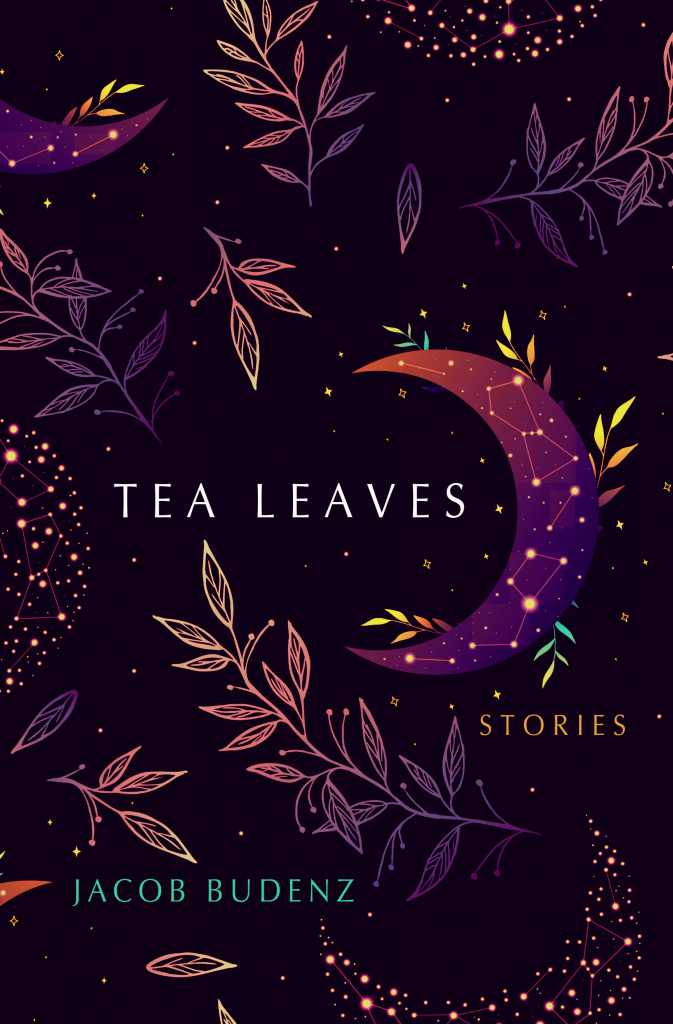In Tea Leaves, a new collection of short stories, Baltimore-based author Jacob Budenz invokes a queer cast of fantastical oddballs making their way in the world we share. From an aspiring magician filled with regrets related to student debt, a deadbeat demon who practices astral projection to compete in speed-eating contests, and a televised semi-psychic who can read the hearts (and late-night snacking proclivities) of viewers, to a baritone octopus passing judgment on human lives from within a coffee shop bathroom, these characters may seem mythical but they are just as mired in the mundane as anyone.
Mostly set in places or situations that exist as a veil on the contemporary American South, the stories conjure a realm of the extra-ordinary, a respite from the ordinary. They evoke alternate worlds in which “taking a flight” may mean transforming into a peregrine falcon for a trip to Miami to battle a witch in his “subtropical convenience store kingdom”—but it turns out even shapeshifters keep secrets from their fiancées. Indeed, Budenz has a talent for teasing out these incongruities, juxtaposing them with biting humor about the vanity and pettiness that enchanted entities share with their human counterparts, while embracing queerness and examining marginalization and isolation. In this, Tea Leaves has a kinship with Carmen Maria Machado’s collection of genre-defying short fiction, Her Body and Other Parties, and these stories will also appeal to readers of Kelly Link and Neil Gaiman— authors who Budenz cites as influences.

Tea Leaves features a mix of stories that Budenz published in the past decade, as well as previously unpublished work. “I tried to include a handful of shorter, more lyrical pieces, because although a fully cross-genre collection wouldn’t really make sense for me, I publish a lot of poetry too and wanted to make sure to represent something of that sensibility in my first full-length book,” says Budenz. “It became pretty clear early on that this collection wanted to swing between campy and dark, lyrical work. So I just ran with that and tried to arrange it so that pockets of the manuscript explored different subjects, themes, or tones in a way that felt complementary.”
When it comes to craft, Budenz says, “I almost always start with an image, a scene, or a broad esoteric or whimsical concept and let the story or poem figure out what it wants to be as I’m writing the first draft. In the story ‘Mask for Mask,’ I didn’t really set out to ‘say something’ about toxic masculinity and ageism in gay communities. I wrote that first scene because I thought it was silly—a gay guy doing a swamp tour for a bunch of lizard people disguised as frat bros—and then just played with the dials and knobs, so to speak, until something more meaningful emerged.”
Budenz adds, “In trying to write queer characters authentically, usually an obstacle a queer person might face in contemporary society floats to the surface very organically as something to raise the stakes of the story, and if I’m lucky, it merges with the supernatural element of the story. It doesn’t always work that way, of course, and I don’t like to force a metaphor if a story just wants to be about queer people experiencing something weird or unnatural that has nothing to do with their gender or sexuality. I try to be careful with the supernatural-element-as-metaphor thing, because I believe that the reader is the authority on what a story means, not the author.” A clever exploration of these questions about authority, interpretation, and gender also shows up in “A Theory of Lampposts,” one of the stories included in Tea Leaves.
Budenz is a self-described queer author, multi-disciplinary performer, educator, and witch whose work focuses broadly on the intersection of otherness and the otherworldly. Working across mediums, Budenz is able to cross-pollinate: poetry influencing music, performance shaping prose. “I’ve always been obsessed with the sounds of words, and even though I’ve been playing piano my whole life, I didn’t start writing music until well after I’d been writing stories,” Budenz reflects. “And it goes without saying that working as a fiction writer influences the rest of my work as well, especially when it comes to narrative arc and storytelling.” Listening to Moth Broth, Budenz’s psychedelic witch pop band, these connections are never far away in songs like “Fairy Queen” and “Your Toenail (a Spell),” which have lyrics, vocals, and synths by the author.
Currently developing a new project with Moth Broth, Budenz is also working on fiction that has a more realistic tone, in order to grapple with the topic of predatory behavior and abuse in art scenes. Budenz says, “It’s an ongoing problem in numerous art scenes I’ve inhabited, and although I’m not talking about real people or events, it’s likely to ruffle some feathers. If it winds up being novella length after some revisions, or even just very short-novel length, I might throw in some of the grittier, heavier, or less whimsical short stories that didn’t make it into Tea Leaves.” For now, fans of Tea Leaves can enjoy additional short stories by Budenz in publications including Taco Bell Quarterly and Wussy, as well as the new anthology, The Experiment Will Not Be Bound, and on jakebeearts.com.
